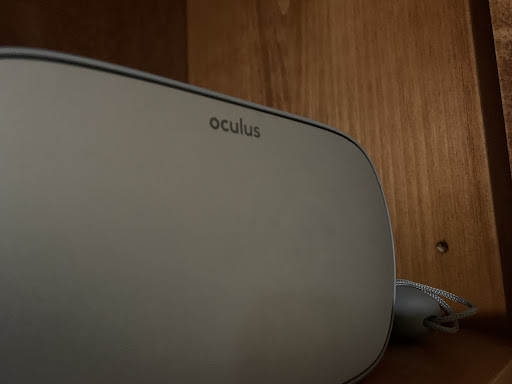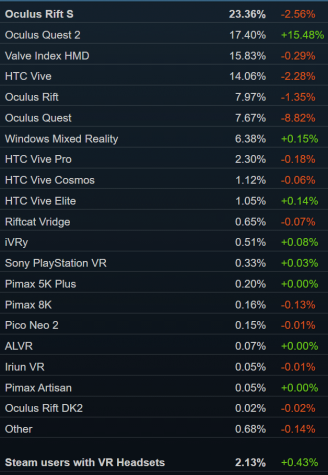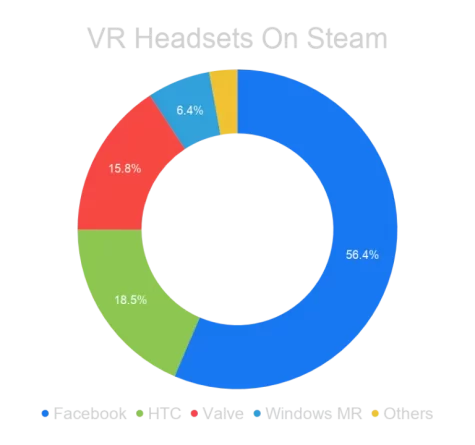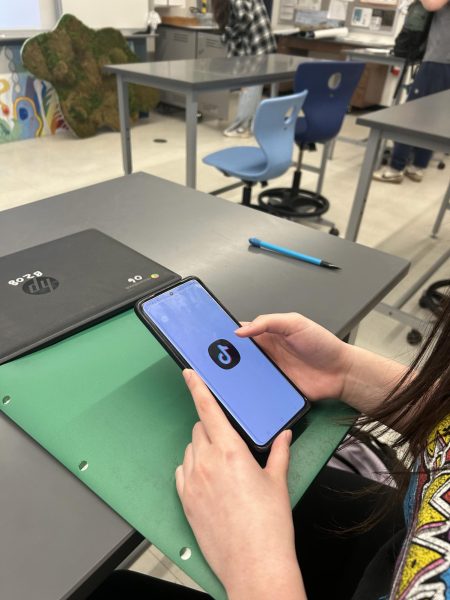A world of pixels: the impact of the Metaverse

An Oculus Go headset sits on the top of a shelve, collecting dust.
Facebook’s Mark Zuckerberg announced the company has changed its name to Meta during a virtual event on October 28. This starts a move of the giant tech company steering itself towards virtual reality (VR), and the creation of the Metaverse.
The Metaverse is a virtual universe, designed to bring things from the real world to the virtual world. This would include concerts, sporting events, business meetings, and can have positive social impacts, with people making new friends, discovering new hobbies, social spaces, games, and more. Although it was announced in late October, the total cost is still unknown to the public, though the BBC states those involved are, “investing billions in the project.” The individuals behind the creation of Metaverse are also unknown at the current moment, but is mainly headed by Zuckerberg.
Social implications will also play a big role in how Metaverse affects people, due to some stressing concerns of extreme harassment or misinformation spreading on the platform that many claim Facebook has been slow to deal with over the past several years. Philip Rosedale, the founder of the online game called Second Life, said during an interview with the Associated Press, “‘The danger is creating online public spaces that appeal only to a polarized, homogeneous group of people,’” describing how Metaverse could further fuel online hate, which is supported with Zuckerberg saying during the Meta announcement, “you’re going to able to do almost anything you can imagine.”
Many people though in the VR and tech industry see Metaverse as a gain for the community, and as a way to present this technology to the masses in the future. These impacts can be felt across the world, our country, or just our community. Sebastian Fortuna, a Game & Web Design teacher & one of the heads of the E-Sports’ program at Hall High School gave his input to the situation, stating, “I feel like it’s a great avenue that opens up a new type of entertainment.” He then goes onto explain the roles Metaverse could have in shaping classrooms, business, and professions, saying, “I know VR has become a huge topic within architecture, so they’re able to do 3D walk-throughs with architecture so it’s become a huge industry, and it allows us to be present where we can’t be present. From an educational standpoint you’d be able to visit certain monuments, places around the world you wouldn’t be able to unless you had a plane ticket. So it definitely opens up a new world in a sense.”
It has also been seen as a way to transform the already large VR market, into an even larger one, however, the drawbacks if not handled correctly are present. Bethany Brown, a Cryptography and Cybersecurity teacher shared her thoughts on what could happen if Metaverse isn’t regulated. She says, “If Metaverse is not regulated I think there will be issues with people trying to monopolize the market, cybersecurity hacks, and no limit on the cost/profit of the environments that offer VR experiences.” Through technological innovations, it has been seen that Facebook’s grip over the current VR market could be seen as dangerous, as with any other market, and could greatly affect people’s lives when it comes to decisions on headsets you can use, advertising in VR, and the selling of private data. As noted by Brown, companies who’d have such a large stake in the market have a huge say in what is produced and how it sways many VR companies, especially when it comes to their headset sales and what they’d be allowed to make in the Metaverse.
Facebook acquired the VR company Oculus back in 2014 for $2 billion, and ever since has greatly expanded its share in the VR market. As of 2020 alone, Oculus headsets made up 56.4% of headsets used on Steam, a popular game streaming app, meaning over half of all headsets are owned by Oculus. In addition, just 2.13% of Steam users own a VR headset, though that number has risen by .43%, which in total is 2,556,000 people. This includes how 4 out of the top 6 most used headsets on the list are those from Oculus, showing that again, Facebook with their personal decisions, can affect an enormous chunk of the VR community/market. This number of people is approximately 1,441,584 people on Steam VR that own an Oculus headset, equivalent to the population of the states of New Hampshire or Hawaii for reference.

Although their stake in the market is so large, not much is understood about why Facebook changed their name to Meta, although many have guess’ as to why. Fortuna says, “I think they wanted to get away from the stigma of being just a social media company. I think if they’d stayed as Facebook people will only refer to them as the website, I think Meta kinda gives them an option to be more, to incorporate the other brands such as Oculus, and other future investments and endeavors, so they’re allowed to kind of steer away from, ‘okay we’re not just social media, we also are a tech company as a whole.”
Other opinions on Zuckerberg’s endgame have been shared, with Hall student Riley Macca stating, “I honestly don’t know what Mark Zuckerberg’s ultimate goal is for Meta. He did rename the company from Facebook to Meta, implying he intends to create an interconnected ecosystem of platforms, both hardware–as in devices–and software, like the Metaverse. It’s very possible he is just trying to secure his legacy further,” suggesting that he could be doing this to reshape his image in the public eye and how others in the tech industry may view him.
Brown’s thoughts on the current situation were that, “I think Facebook is taking the leap for VR because they want to be at the forefront of this cutting-edge technology so that they can continue to monopolize the virtual environment,” explaining that Facebook could be doing this for personal gain and to expand their technological empire further, not to really help humans evolve technologically necessarily.
The AP News article regarding Metaverse stated, “Evan Greer, an activist with Fight for the Future, said it’s easy to see Facebook’s Meta announcement as a cynical attempt to distance itself from all the scandals the company is facing. But she says Meta’s push is actually even scarier.” She then goes on to mention in the article, “This is Mark Zuckerberg revealing his end game, which is not just to dominate the internet of today but to control and define the internet that we leave to our children and our children’s children.” With many different perspectives on the situation, it’s difficult to determine what Facebook’s true intentions are with Metaverse. It is simply a waiting game to see what Meta’s next move is, regarding their steps into VR in the future.






